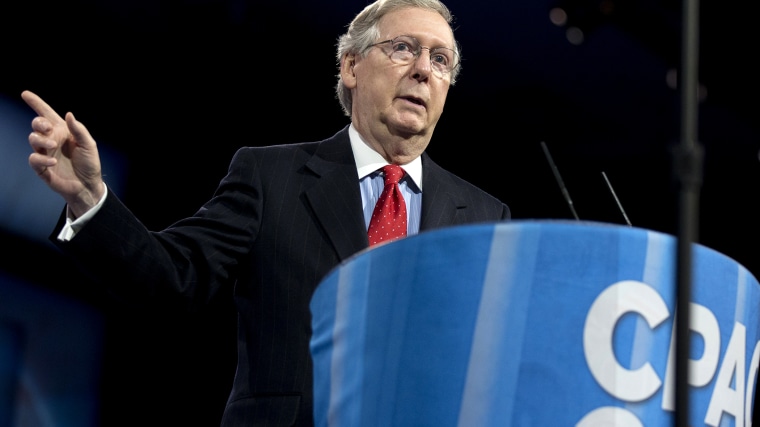After a closed-door meeting with his GOP colleagues, Senate Minority Leader Mitch McConnell (R-Ky.) hosted a brief press conference with reporters. The very first words of out of his mouth were, "Well, good afternoon, everyone. As all of you have noticed, the Senate has reached a new level of dysfunction."
Yes, the one senator who bears more responsibility than anyone for Senate dysfunction has decided to start complaining about Senate dysfunction.
Senate Minority Leader Mitch McConnell (R-Ky.) blamed Senate Democrats for the limited number of bills that have reached President Obama's desk this year. "Since last summer, he's barely picked up the phone. And his bill-signing pen is literally starting to rust," McConnell said of President Obama. McConnell argued legislating has slowed in the Senate because Democrats are focused more on the midterm elections than passing bills.
Look, it's an election year. I get it. McConnell wants his party to regain the majority, so he feels compelled to make ridiculous comments -- somehow, with a straight face -- in the hopes that his unpopular party will avoid the blame for creating the least productive do-nothing Congress on record. It's a perfectly understandable goal. If I were in McConnell's shoes, and my party had killed all kinds of worthwhile legislation that enjoys broad support, I might try this, too.
But hearing Mitch McConnell complain about Capitol Hill dysfunction is a bit like hearing Uruguay's Luis Suarez complaining about biting in soccer. It requires a failure of self-awareness that's almost too staggering to contemplate.
The Minority Leader has taken congressional obstructionism to a level unseen in American history, effectively rewriting the rules of federal governance because it suited his partisan agenda.
McConnell has created gridlock the likes of which our nation's founders couldn't have even imagined. Jon Chait recently argued that the Kentucky Republican "hacked American politics," effectively upending how our legislative system was designed to work.
Indeed, as long-time readers may recall, McConnell has been quite candid about how and why he's refused to work cooperatively with Democrats on addressing the nation's problems.
* In March 2010, McConnell explained his decision to try to kill health care reform from the outset, no matter what Democrats offered in the way of compromise solutions, by demanding unanimous Republican opposition: “It was absolutely critical that everybody be together because if the proponents of the bill were able to say it was bipartisan, it tended to convey to the public that this is O.K., they must have figured it out.” It’s a dynamic that made compromise, quite literally, impossible.
* Soon after, McConnell explained the importance he and the House GOP leadership put on “unify[ing] our members in opposition” to everything Democrats propose, regardless of merit, because unanimous Republican disagreement would necessarily make Democratic ideas less popular. “Public opinion can change, but it is affected by what elected officials do,” McConnell conceded. “Our reaction to what [Democrats] were doing had a lot to do with how the public felt about it. Republican unity in the House and Senate has been the major contributing factor to shifting American public opinion.”
* In August 2010, McConnell said he’ll only consider negotiating with the White House if they agree to accept center-right proposals, with no exceptions, even if there’s a Democratic majority.
* In October 2010, McConnell conceded on the record that defeating the president in 2012 was his “top priority,” above literally everything else, adding, “Our single biggest political goal is to give our nominee for president the maximum opportunity to be successful.”
If McConnell wants to take pride in his destructive handiwork, that's entirely up to him. If he wants to hide his startling achievements, that's his right, too. But what McConnell shouldn't do is whine publicly about congressional dysfunction, at least if he wants to avoid being laughed at.
